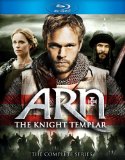| Reviews & Columns |
|
Reviews DVD TV on DVD Blu-ray 4K UHD International DVDs In Theaters Reviews by Studio Video Games Features Collector Series DVDs Easter Egg Database Interviews DVD Talk Radio Feature Articles Columns Anime Talk DVD Savant Horror DVDs The M.O.D. Squad Art House HD Talk Silent DVD
|
DVD Talk Forum |
|
|
| Resources |
|
DVD Price Search Customer Service #'s RCE Info Links |
|
Columns
|
|
|
Arn: The Knight Templar -- The Complete Series
Entertainment One // Unrated // June 5, 2012
List Price: $34.98 [Buy now and save at Amazon]
The Film(s) and/or TV Series:
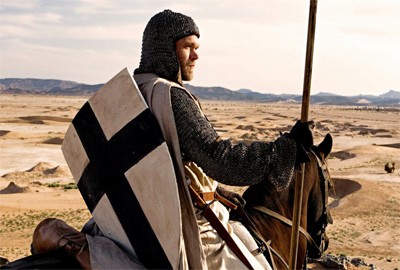 While this review covers the four-hour version of Arn: The Knight Templar, the evaluation of the themes, characterizations, photography, and overall impression left by the film remains largely intact. Therefore, that previous review has been reprinted, mostly in its entirety, from the original DVD evaluation found here:
While this review covers the four-hour version of Arn: The Knight Templar, the evaluation of the themes, characterizations, photography, and overall impression left by the film remains largely intact. Therefore, that previous review has been reprinted, mostly in its entirety, from the original DVD evaluation found here:
Based on Swedish author Jan Guillou's trilogy of books, Arn: The Knight Templar tells a story of diligence, composure, and love in the face of tumultuous circumstances -- a pretty familiar topic for historical epics, fictionalized or not. The film takes place in the mid-12th century during the time of the Crusades, where Arn (Joakim Nätterqvist), a young monk raised in a convent since childhood, learns the ways of battle from a fellow practitioner who used to be a Knight Templar. He eventually returns to his land and family as a composed, skillful man trained in the ways of battle and piousness, while his homeland's caught in the middle of a blunt-headed clan dispute. Though the wars (The Crusades) he unwillingly fights in obviously have nothing directly to do with the clan struggles, the story of a helpless boy primed in the ways of dignity and combat for warfare sounds like something we've heard before -- just in another place, amid another conflict. And yes, to top it off, he meets a woman when he returns home, someone who will become his inspiration.
Arn: The Knight Templar's formula shares more than a few similarities to other period action-dramas, namely Braveheart in its structure around a maturing man and Kingdom of Heaven in thematic essence. Yet, is there anything necessarily wrong with borrowing from other productions to tell its own passionate story, one filled with like-minded blade-clanking and patriotic chest-thumping? In this case, no; Peter Flinth's picture, a joint venture produced by Sweden and four other countries for roughly $30 million, molds this arrangement into its own distinctive, handsome piece of historical fiction. With polished sincerity, it takes the grandness of scope that typically propels entries in the genre and marches through the formula, concerning itself less with battle set pieces and more with the period's misguided grasp on virtue.
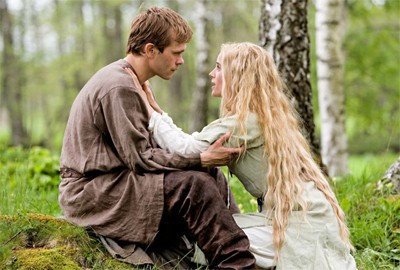 The big difference comes in Arn's inspiration, his honest and simple love for a woman named Cecilia (Sofia Helin), and the fact that she's alive instead of having her death vengefully drive him through the Crusades. Arn: The Knight Templar instead tells a conflicted romantic tale about their unwanted separation, decreed over a controversy among his people; Cecilia, with child and out of wedlock, is sent to live a life of holy servitude in a nunnery, under harsh scolding and whip-lashing disguised as a pathway to God's righteousness. Arn, serving his side of the punishment, sets off to fight in the Crusades with the skills he's been armed with from his early years with the former Knight Templar. Their reliance on one another as motivation, just to see each again through their circumstances, is skillfully used in the film as a subdued driver, mixing with their religion-bound conflicts in a way that veers from romantic sappiness into an authentic projection of longing and perseverance.
The big difference comes in Arn's inspiration, his honest and simple love for a woman named Cecilia (Sofia Helin), and the fact that she's alive instead of having her death vengefully drive him through the Crusades. Arn: The Knight Templar instead tells a conflicted romantic tale about their unwanted separation, decreed over a controversy among his people; Cecilia, with child and out of wedlock, is sent to live a life of holy servitude in a nunnery, under harsh scolding and whip-lashing disguised as a pathway to God's righteousness. Arn, serving his side of the punishment, sets off to fight in the Crusades with the skills he's been armed with from his early years with the former Knight Templar. Their reliance on one another as motivation, just to see each again through their circumstances, is skillfully used in the film as a subdued driver, mixing with their religion-bound conflicts in a way that veers from romantic sappiness into an authentic projection of longing and perseverance.
During Arn's time in the Crusades, Arn: The Knight Templar exercises the bulk of the film's production budget with gritty, reality-bound war sequences that rely more on practicality and earthy tension than chaotic lavishness. You're not going to see a lot of heads and arms lopped off or blood spraying, aside from one grin-inducing brutal maneuver from Arn -- and even that takes place before the actual war. The Moroccan-shot battles instead swirl with dust and clanking metal in a way that feels authentic and less aimed at sating action hounds, tapping into the harshness and survival within the conditions. And, moreover, they're few and far between, used strategically for storytelling and only hitting a handful of wide-scope battles. Whether the lack of visceral engagement takes away from the brutality of war will largely be in the eyes of the viewer, but the restraint on action sequences actually serves the film's more dramatic temperament rather well -- especially considering the conversations between Arn and his opponent, Saladin, about the fabric of honor and warfare.
Arn: The Knight Templar instead concerns itself with the demanding events that unfold in Arn and Cecilia's lives and the way that religion's convictions force them into dire circumstances, though the film opts to say more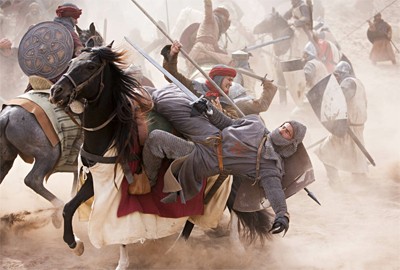 about belief than about the era's archaic perception of religion. In that respect, it's hard not to think about František Vláčil's The Valley of the Bees, a more thought-provoking existential piece that deals with a knight struggling with his unsolicited ascription to holy service. Arn, unlike the character in that film, finds peace within his early years of training and his belief in God, whereas Cecilia's oppression at the nunnery -- complete with nasty quips from the head nun about Arn never returning -- exemplifies the misconstrued institution that the Crusades are fighting for. The depiction might not be dynamic, mostly just communicating the period's harsh and volatile view on maintaining religion, but it's still an evocative magnet for both characters as they bide their time until a reunion.
about belief than about the era's archaic perception of religion. In that respect, it's hard not to think about František Vláčil's The Valley of the Bees, a more thought-provoking existential piece that deals with a knight struggling with his unsolicited ascription to holy service. Arn, unlike the character in that film, finds peace within his early years of training and his belief in God, whereas Cecilia's oppression at the nunnery -- complete with nasty quips from the head nun about Arn never returning -- exemplifies the misconstrued institution that the Crusades are fighting for. The depiction might not be dynamic, mostly just communicating the period's harsh and volatile view on maintaining religion, but it's still an evocative magnet for both characters as they bide their time until a reunion.
Though heartfelt and resonant by way of two nuanced performances from Joakim Nätterqvist and Sofia Helin as Arn and Cecilia, not to mention photographed splendidly by The Girl with the Dragon Tattoo cinematographer Eric Kress, Arn: The Knight Templar can't avoid sluggishly moving through its final acts due to heavy pacing. [...] But as Arn's horse gallops in front of his compatriots before be delivers an inspiring speech, all but wielding a Claymore and sporting blue facepaint, the picture still feels justified amid its overlong familiarity. His story focuses on presevering in the face of war while maintaining goodness and fortitude, a more subtly moving point but nonetheless one worth experience in this medieval setting.
So, What's This "Complete Series" Business?
The extended historical epic has almost become something of a cliche, but in the case of Arn: The Knight Templar, it's one of the more liberal modifications you can experience. Entertainment One released a trimmed-to-the-bones cut of Peter Flinth's work a few years prior to this release that, effectively, excised roughly half of the movie's content, which took a 260+ minute saga and transformed it into a more manageable, leaner 133-minute cut. Surprisingly, it achieves much, if not most, of what was originally intended to be taken away from the lavish production. What you'll discover in this new version or Arn is that periphery sub-plots, more casual pacing, and simply more narrative breathing room can do wonders, as this extended cut -- restructured into six episodes, reintegrating all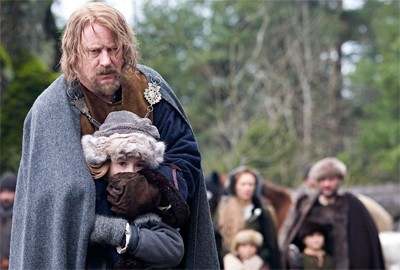 the ditched material so it more closely resembles the two-film structure in which it was meant to be experienced -- constructs a more comprehensive, sprawling, and rewarding tale while treading down the same path and arriving at the same destination as its streamlined, two-hour counterpart.
the ditched material so it more closely resembles the two-film structure in which it was meant to be experienced -- constructs a more comprehensive, sprawling, and rewarding tale while treading down the same path and arriving at the same destination as its streamlined, two-hour counterpart.
Arn was originally released as a pair of films that saw theatrical showings in Sweden between 2007 and 2008, which were re-edited and compressed into a single motion picture for the version Entertainment One previously made available on DVD/Blu-ray. Considering the fact that both films were condensed into the running time of one of 'em, it actually does a rather good job of sticking to the story's core essence and emotional poise: Arn's growth into a faith-fueled warrior, the blossom of his love for Cecilia, their conflicts with their beliefs amid individual strife, and the events that unfold around their separation and crises of faith and fortitude. With the opportunity for relaxed, lush exposition available here, the story feels much more at-ease with its pacing and heavy tonality; extensive additions to Arn's childhood, the star-crossed romance with Cecilia, his relationship with a former prince of the land, and the events before and after The Crusades offer a clearer, focused portrait with intricate facets that seamlessly connect to the story, instead of the tunnel-visioned purpose that the previous cut exhibits. And yes, questions left vague in the previous cut are answered, though the dramatic peaks and valleys remain largely the same in context.
Recently, I had the pleasure of reviewing the Dragon Tattoo Trilogy: Extended Editions, which embody a similar situation to that of Arn: The Knight Templar: improvements can be seen in the mere restructuring and rearrangement of familiar content, which hearken to their original creative intentions. Each "episode" lasts roughly 45 minutes in length, and each one discovers thematically-relevant stopping points, many cliffhangers, that round them off without feeling out-of-place. Viewing all 260+ minutes of Peter Flinth's production in one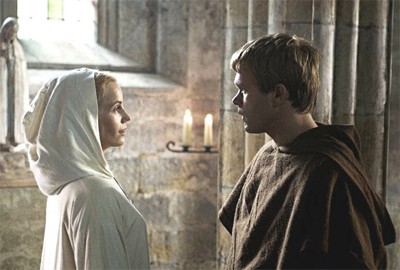 stretch might prove daunting on its own, but when broken up in these bursts -- or viewed in the original two-movie (three episode) structure, something mostly possible here -- the additional content rarely feels daunting or long-winded, instead revealing a caliber of graceful cinematic flow and easiness of tone that's not as readily accessible in the stiff, limited, point-driven shorter cut. That's not to say that the added material universally improves the story; several sequences meander and linger beyond what the content's momentum can sustain, both the existing older elements and the newly-added subplots and character moments. Everything does, however, feel far more cohesive and less disjointed.
stretch might prove daunting on its own, but when broken up in these bursts -- or viewed in the original two-movie (three episode) structure, something mostly possible here -- the additional content rarely feels daunting or long-winded, instead revealing a caliber of graceful cinematic flow and easiness of tone that's not as readily accessible in the stiff, limited, point-driven shorter cut. That's not to say that the added material universally improves the story; several sequences meander and linger beyond what the content's momentum can sustain, both the existing older elements and the newly-added subplots and character moments. Everything does, however, feel far more cohesive and less disjointed.
Aesthetically, Arn: The Knight Templar appears different as well, where Eric Kress's cinematography -- similarly, again, to Dragon Tattoo -- has been opened up from a 2.35:1-matted aspect ratio to the TV-friendly 1.78:1. Often, I don't like to be prescriptive in terms of which ratio is preferred over the other without direct information about the director's "intention", but there's something profound to be acknowledged about the natural airiness achieved in this new framing. Nearly every single shot benefits from this artistic choice, and, more importantly, the added information at the top and bottom of the image never extends into the open-matted territory of feeling excessive or unwarranted. Skylines are extended, taller shots of trees and buildings add to the visual splendor, and there's a unanimous improvement in the intimacy and focus of conversational close-ups that capture more of the casts' nuanced facial shifts. Quite simply, this is how Arn seems like it's supposed to feel: open-aired and sprawling.
The Blu-ray:
Arn: The Knight Templar sees its second Blu-ray release from Entertainment One in this two-disc package, but the shifts in content aren't really enough to deem this a "double dip", really. New artwork on th cover and discs themselves integrate elements from the Swedish posters, while the inner-insert designi takes stills from the film and splices them together in. An appealing cross-themed mosaic. Most of the production appears on the first disc, whil roughly 25% -- the conclusion -- and the special features appear on the second disc. Note that no new special features appear on this Blu-ray, only the same elements from the previous DVD/Blu-ray (which has been reprinted at the bottom).
Video and Audio:
Entertainment One have impressed me with this one. Arn: The Knight Templar arrives from the company in a 1.78:1 1080p AVC treatment, but it's not evenly-distributed among the discs: a little over three hours in content appears on the first disc, while the remainder of the production -- and roughly forty-five (45) minutes of special features -- appear on the second disc. Most of the compliments paid to this Blu-ray, though, can actually apply to both sides of the material, which is a compliment in itself. Eric Kress' focus on color palette receives far more focus in the extended version; vivid green, yellows, and other colors diffuse the dominant, under-saturated cold blue tones of the shorter cut. There's delicateness in the high-definition presentation of skin tones and texture, notably when focused on the varying close-ups and exceptionally-handled costume work, where points like chainmail armor and rough-spun garments reveal a bevy of textures. Detail remains consistently strong, colors rarely bleed or appear over-saturated, and the film-like movement presented in 24fps remains smooth and satisfying. You'll spot a few instances of washed-out contrast and heavy grain, sure, and it does take the image down a few pegs, but we're largely working with an impressive treatment here.
One of the biggest compliments you can give an HD audio rendering is that the score claims a more dominant, evocative presence above its standard-definition counterpart, and that's something Arn's 5.1 DTS-HD Master Audio track achieves quite eloquently. The sweeping, delicate nature of the score telegraphs an impact it didn't have on me when watching the theatrical cut (in fact, it was pretty forgettable in that setting), carrying the film through its emotionally-resonant moments with well-balanced instrumentals, mindful bass usage, and a keen ear for balance with dialogue. Everything else remains largely the same, though exhibiting the expected boosts in clarity and balance one would anticipate in the elevation to a higher-quality track: dialogue pours through clean and clear, both in English and the various other languages used in the film, while the clanking of blades, the thwomp of arrows, and the galloping of horses push the limits without distortion. There's not a lot that really stands out from the mix, but what's here does justice to the aural essence desired by Flinth and his crew.
One unfortunate element, however, comes in Entertainment One's choice for English SDH as the sole subtitle option, which also includes subtitles for the English-spoken dialogue and descriptions of the sound effects -- a baby cooing, a horse whinnying, and so on and so forth. It's unfortunate but tolerable, at at least the text is razor-sharp in its grammatical context.
Special Features:
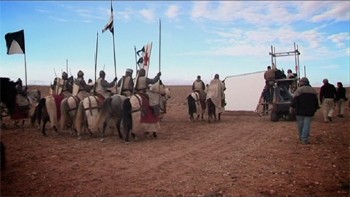 Though low on numbers in the supplemental department, E1 Entertainment have included two Behind the Scenes featurettes (21:29, 21:23; 16x9) that delve fairly deep into the film's construction and the weight of its $30 million budget. The first "half" of the material is mostly driven by an interview with Joakim Nätterqvist, featuring snippets of behind-the-scenes shots and other material that's consequential to what he's talking about at the time. He discusses the budget, the books (and his lack of reading experience), Jan Guillou's participation, and the assortment of actors from different corners of the world. The second half takes on a similar rhythm, but fueled by interviews with Stellan Skarsgard and Sofia Helen. Deleted scenes, footage of Peter Flinth commanding the set, and other off-the-cuff shots populate this second piece, including a fair amount of focus on the excised portions of the movie. Coming together into a 40+ minute feature when watched back-to-back, it's a good mix of insight, snippets from the film, and filler.
Though low on numbers in the supplemental department, E1 Entertainment have included two Behind the Scenes featurettes (21:29, 21:23; 16x9) that delve fairly deep into the film's construction and the weight of its $30 million budget. The first "half" of the material is mostly driven by an interview with Joakim Nätterqvist, featuring snippets of behind-the-scenes shots and other material that's consequential to what he's talking about at the time. He discusses the budget, the books (and his lack of reading experience), Jan Guillou's participation, and the assortment of actors from different corners of the world. The second half takes on a similar rhythm, but fueled by interviews with Stellan Skarsgard and Sofia Helen. Deleted scenes, footage of Peter Flinth commanding the set, and other off-the-cuff shots populate this second piece, including a fair amount of focus on the excised portions of the movie. Coming together into a 40+ minute feature when watched back-to-back, it's a good mix of insight, snippets from the film, and filler.
Also, a Trailer (2:19, 16x9) fills out the rest of the material.
Final Thoughts:
Peter Flinth's Arn: The Knight Templar isn't an innovative picture, but it does use the historical epic formula set in motion by the likes of Braveheart to tell a sweeping, handsome, often emotional tale set during the time of the Crusades. It counterbalances that nagging sensation of familiarity with the resonant romance between Arn and Cecilia, as well as a heavy-handed yet effective portrait of religion's domineering presence during the time -- and the honest, innocent faith that grows underneath. Though it lacks the oomph that other grand-scale epics deliver in persistent action and loses its steam when approaching a fairly foreseeable conclusion, it's still a headstrong story worth checking out for the way it projects the resilience of virtue and faith when they're shackled down.
This Extended Cut / "Complete Series" version of Arn: The Knight Templar on Blu-ray doesn't alter that overall perception of the production's foundation and building blocks, even if it doubles the amount of historical material you're experiencing; however, it does allow the content to breathe and develop much more organically through compelling exposition, fluid pacing, and an overall sense of emotional and narrative completeness in illustrating Arn's triumph over his foes, his thwarted love, and his complicated faith. The Blu-ray looks and sounds terrific, too, so it's definitely work seeking out for those who relish epics with sweeping emotional arcs and the occasional exertion of brutality through impeccably-produced, well-written cinema. Strongly Recommended.
Thomas Spurlin, Staff Reviewer -- DVDTalk Reviews | Personal Blog/Site
 While this review covers the four-hour version of Arn: The Knight Templar, the evaluation of the themes, characterizations, photography, and overall impression left by the film remains largely intact. Therefore, that previous review has been reprinted, mostly in its entirety, from the original DVD evaluation found here:
While this review covers the four-hour version of Arn: The Knight Templar, the evaluation of the themes, characterizations, photography, and overall impression left by the film remains largely intact. Therefore, that previous review has been reprinted, mostly in its entirety, from the original DVD evaluation found here: Based on Swedish author Jan Guillou's trilogy of books, Arn: The Knight Templar tells a story of diligence, composure, and love in the face of tumultuous circumstances -- a pretty familiar topic for historical epics, fictionalized or not. The film takes place in the mid-12th century during the time of the Crusades, where Arn (Joakim Nätterqvist), a young monk raised in a convent since childhood, learns the ways of battle from a fellow practitioner who used to be a Knight Templar. He eventually returns to his land and family as a composed, skillful man trained in the ways of battle and piousness, while his homeland's caught in the middle of a blunt-headed clan dispute. Though the wars (The Crusades) he unwillingly fights in obviously have nothing directly to do with the clan struggles, the story of a helpless boy primed in the ways of dignity and combat for warfare sounds like something we've heard before -- just in another place, amid another conflict. And yes, to top it off, he meets a woman when he returns home, someone who will become his inspiration.
Arn: The Knight Templar's formula shares more than a few similarities to other period action-dramas, namely Braveheart in its structure around a maturing man and Kingdom of Heaven in thematic essence. Yet, is there anything necessarily wrong with borrowing from other productions to tell its own passionate story, one filled with like-minded blade-clanking and patriotic chest-thumping? In this case, no; Peter Flinth's picture, a joint venture produced by Sweden and four other countries for roughly $30 million, molds this arrangement into its own distinctive, handsome piece of historical fiction. With polished sincerity, it takes the grandness of scope that typically propels entries in the genre and marches through the formula, concerning itself less with battle set pieces and more with the period's misguided grasp on virtue.
 The big difference comes in Arn's inspiration, his honest and simple love for a woman named Cecilia (Sofia Helin), and the fact that she's alive instead of having her death vengefully drive him through the Crusades. Arn: The Knight Templar instead tells a conflicted romantic tale about their unwanted separation, decreed over a controversy among his people; Cecilia, with child and out of wedlock, is sent to live a life of holy servitude in a nunnery, under harsh scolding and whip-lashing disguised as a pathway to God's righteousness. Arn, serving his side of the punishment, sets off to fight in the Crusades with the skills he's been armed with from his early years with the former Knight Templar. Their reliance on one another as motivation, just to see each again through their circumstances, is skillfully used in the film as a subdued driver, mixing with their religion-bound conflicts in a way that veers from romantic sappiness into an authentic projection of longing and perseverance.
The big difference comes in Arn's inspiration, his honest and simple love for a woman named Cecilia (Sofia Helin), and the fact that she's alive instead of having her death vengefully drive him through the Crusades. Arn: The Knight Templar instead tells a conflicted romantic tale about their unwanted separation, decreed over a controversy among his people; Cecilia, with child and out of wedlock, is sent to live a life of holy servitude in a nunnery, under harsh scolding and whip-lashing disguised as a pathway to God's righteousness. Arn, serving his side of the punishment, sets off to fight in the Crusades with the skills he's been armed with from his early years with the former Knight Templar. Their reliance on one another as motivation, just to see each again through their circumstances, is skillfully used in the film as a subdued driver, mixing with their religion-bound conflicts in a way that veers from romantic sappiness into an authentic projection of longing and perseverance. During Arn's time in the Crusades, Arn: The Knight Templar exercises the bulk of the film's production budget with gritty, reality-bound war sequences that rely more on practicality and earthy tension than chaotic lavishness. You're not going to see a lot of heads and arms lopped off or blood spraying, aside from one grin-inducing brutal maneuver from Arn -- and even that takes place before the actual war. The Moroccan-shot battles instead swirl with dust and clanking metal in a way that feels authentic and less aimed at sating action hounds, tapping into the harshness and survival within the conditions. And, moreover, they're few and far between, used strategically for storytelling and only hitting a handful of wide-scope battles. Whether the lack of visceral engagement takes away from the brutality of war will largely be in the eyes of the viewer, but the restraint on action sequences actually serves the film's more dramatic temperament rather well -- especially considering the conversations between Arn and his opponent, Saladin, about the fabric of honor and warfare.
Arn: The Knight Templar instead concerns itself with the demanding events that unfold in Arn and Cecilia's lives and the way that religion's convictions force them into dire circumstances, though the film opts to say more
 about belief than about the era's archaic perception of religion. In that respect, it's hard not to think about František Vláčil's The Valley of the Bees, a more thought-provoking existential piece that deals with a knight struggling with his unsolicited ascription to holy service. Arn, unlike the character in that film, finds peace within his early years of training and his belief in God, whereas Cecilia's oppression at the nunnery -- complete with nasty quips from the head nun about Arn never returning -- exemplifies the misconstrued institution that the Crusades are fighting for. The depiction might not be dynamic, mostly just communicating the period's harsh and volatile view on maintaining religion, but it's still an evocative magnet for both characters as they bide their time until a reunion.
about belief than about the era's archaic perception of religion. In that respect, it's hard not to think about František Vláčil's The Valley of the Bees, a more thought-provoking existential piece that deals with a knight struggling with his unsolicited ascription to holy service. Arn, unlike the character in that film, finds peace within his early years of training and his belief in God, whereas Cecilia's oppression at the nunnery -- complete with nasty quips from the head nun about Arn never returning -- exemplifies the misconstrued institution that the Crusades are fighting for. The depiction might not be dynamic, mostly just communicating the period's harsh and volatile view on maintaining religion, but it's still an evocative magnet for both characters as they bide their time until a reunion. Though heartfelt and resonant by way of two nuanced performances from Joakim Nätterqvist and Sofia Helin as Arn and Cecilia, not to mention photographed splendidly by The Girl with the Dragon Tattoo cinematographer Eric Kress, Arn: The Knight Templar can't avoid sluggishly moving through its final acts due to heavy pacing. [...] But as Arn's horse gallops in front of his compatriots before be delivers an inspiring speech, all but wielding a Claymore and sporting blue facepaint, the picture still feels justified amid its overlong familiarity. His story focuses on presevering in the face of war while maintaining goodness and fortitude, a more subtly moving point but nonetheless one worth experience in this medieval setting.
So, What's This "Complete Series" Business?
The extended historical epic has almost become something of a cliche, but in the case of Arn: The Knight Templar, it's one of the more liberal modifications you can experience. Entertainment One released a trimmed-to-the-bones cut of Peter Flinth's work a few years prior to this release that, effectively, excised roughly half of the movie's content, which took a 260+ minute saga and transformed it into a more manageable, leaner 133-minute cut. Surprisingly, it achieves much, if not most, of what was originally intended to be taken away from the lavish production. What you'll discover in this new version or Arn is that periphery sub-plots, more casual pacing, and simply more narrative breathing room can do wonders, as this extended cut -- restructured into six episodes, reintegrating all
 the ditched material so it more closely resembles the two-film structure in which it was meant to be experienced -- constructs a more comprehensive, sprawling, and rewarding tale while treading down the same path and arriving at the same destination as its streamlined, two-hour counterpart.
the ditched material so it more closely resembles the two-film structure in which it was meant to be experienced -- constructs a more comprehensive, sprawling, and rewarding tale while treading down the same path and arriving at the same destination as its streamlined, two-hour counterpart. Arn was originally released as a pair of films that saw theatrical showings in Sweden between 2007 and 2008, which were re-edited and compressed into a single motion picture for the version Entertainment One previously made available on DVD/Blu-ray. Considering the fact that both films were condensed into the running time of one of 'em, it actually does a rather good job of sticking to the story's core essence and emotional poise: Arn's growth into a faith-fueled warrior, the blossom of his love for Cecilia, their conflicts with their beliefs amid individual strife, and the events that unfold around their separation and crises of faith and fortitude. With the opportunity for relaxed, lush exposition available here, the story feels much more at-ease with its pacing and heavy tonality; extensive additions to Arn's childhood, the star-crossed romance with Cecilia, his relationship with a former prince of the land, and the events before and after The Crusades offer a clearer, focused portrait with intricate facets that seamlessly connect to the story, instead of the tunnel-visioned purpose that the previous cut exhibits. And yes, questions left vague in the previous cut are answered, though the dramatic peaks and valleys remain largely the same in context.
Recently, I had the pleasure of reviewing the Dragon Tattoo Trilogy: Extended Editions, which embody a similar situation to that of Arn: The Knight Templar: improvements can be seen in the mere restructuring and rearrangement of familiar content, which hearken to their original creative intentions. Each "episode" lasts roughly 45 minutes in length, and each one discovers thematically-relevant stopping points, many cliffhangers, that round them off without feeling out-of-place. Viewing all 260+ minutes of Peter Flinth's production in one
 stretch might prove daunting on its own, but when broken up in these bursts -- or viewed in the original two-movie (three episode) structure, something mostly possible here -- the additional content rarely feels daunting or long-winded, instead revealing a caliber of graceful cinematic flow and easiness of tone that's not as readily accessible in the stiff, limited, point-driven shorter cut. That's not to say that the added material universally improves the story; several sequences meander and linger beyond what the content's momentum can sustain, both the existing older elements and the newly-added subplots and character moments. Everything does, however, feel far more cohesive and less disjointed.
stretch might prove daunting on its own, but when broken up in these bursts -- or viewed in the original two-movie (three episode) structure, something mostly possible here -- the additional content rarely feels daunting or long-winded, instead revealing a caliber of graceful cinematic flow and easiness of tone that's not as readily accessible in the stiff, limited, point-driven shorter cut. That's not to say that the added material universally improves the story; several sequences meander and linger beyond what the content's momentum can sustain, both the existing older elements and the newly-added subplots and character moments. Everything does, however, feel far more cohesive and less disjointed. Aesthetically, Arn: The Knight Templar appears different as well, where Eric Kress's cinematography -- similarly, again, to Dragon Tattoo -- has been opened up from a 2.35:1-matted aspect ratio to the TV-friendly 1.78:1. Often, I don't like to be prescriptive in terms of which ratio is preferred over the other without direct information about the director's "intention", but there's something profound to be acknowledged about the natural airiness achieved in this new framing. Nearly every single shot benefits from this artistic choice, and, more importantly, the added information at the top and bottom of the image never extends into the open-matted territory of feeling excessive or unwarranted. Skylines are extended, taller shots of trees and buildings add to the visual splendor, and there's a unanimous improvement in the intimacy and focus of conversational close-ups that capture more of the casts' nuanced facial shifts. Quite simply, this is how Arn seems like it's supposed to feel: open-aired and sprawling.
The Blu-ray:
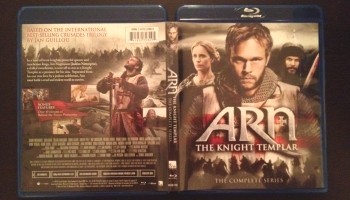 | 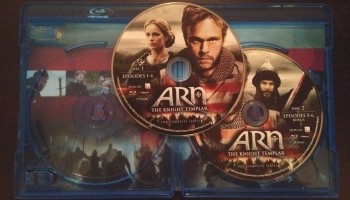 |
Arn: The Knight Templar sees its second Blu-ray release from Entertainment One in this two-disc package, but the shifts in content aren't really enough to deem this a "double dip", really. New artwork on th cover and discs themselves integrate elements from the Swedish posters, while the inner-insert designi takes stills from the film and splices them together in. An appealing cross-themed mosaic. Most of the production appears on the first disc, whil roughly 25% -- the conclusion -- and the special features appear on the second disc. Note that no new special features appear on this Blu-ray, only the same elements from the previous DVD/Blu-ray (which has been reprinted at the bottom).
Video and Audio:
Entertainment One have impressed me with this one. Arn: The Knight Templar arrives from the company in a 1.78:1 1080p AVC treatment, but it's not evenly-distributed among the discs: a little over three hours in content appears on the first disc, while the remainder of the production -- and roughly forty-five (45) minutes of special features -- appear on the second disc. Most of the compliments paid to this Blu-ray, though, can actually apply to both sides of the material, which is a compliment in itself. Eric Kress' focus on color palette receives far more focus in the extended version; vivid green, yellows, and other colors diffuse the dominant, under-saturated cold blue tones of the shorter cut. There's delicateness in the high-definition presentation of skin tones and texture, notably when focused on the varying close-ups and exceptionally-handled costume work, where points like chainmail armor and rough-spun garments reveal a bevy of textures. Detail remains consistently strong, colors rarely bleed or appear over-saturated, and the film-like movement presented in 24fps remains smooth and satisfying. You'll spot a few instances of washed-out contrast and heavy grain, sure, and it does take the image down a few pegs, but we're largely working with an impressive treatment here.
One of the biggest compliments you can give an HD audio rendering is that the score claims a more dominant, evocative presence above its standard-definition counterpart, and that's something Arn's 5.1 DTS-HD Master Audio track achieves quite eloquently. The sweeping, delicate nature of the score telegraphs an impact it didn't have on me when watching the theatrical cut (in fact, it was pretty forgettable in that setting), carrying the film through its emotionally-resonant moments with well-balanced instrumentals, mindful bass usage, and a keen ear for balance with dialogue. Everything else remains largely the same, though exhibiting the expected boosts in clarity and balance one would anticipate in the elevation to a higher-quality track: dialogue pours through clean and clear, both in English and the various other languages used in the film, while the clanking of blades, the thwomp of arrows, and the galloping of horses push the limits without distortion. There's not a lot that really stands out from the mix, but what's here does justice to the aural essence desired by Flinth and his crew.
One unfortunate element, however, comes in Entertainment One's choice for English SDH as the sole subtitle option, which also includes subtitles for the English-spoken dialogue and descriptions of the sound effects -- a baby cooing, a horse whinnying, and so on and so forth. It's unfortunate but tolerable, at at least the text is razor-sharp in its grammatical context.
Special Features:
 Though low on numbers in the supplemental department, E1 Entertainment have included two Behind the Scenes featurettes (21:29, 21:23; 16x9) that delve fairly deep into the film's construction and the weight of its $30 million budget. The first "half" of the material is mostly driven by an interview with Joakim Nätterqvist, featuring snippets of behind-the-scenes shots and other material that's consequential to what he's talking about at the time. He discusses the budget, the books (and his lack of reading experience), Jan Guillou's participation, and the assortment of actors from different corners of the world. The second half takes on a similar rhythm, but fueled by interviews with Stellan Skarsgard and Sofia Helen. Deleted scenes, footage of Peter Flinth commanding the set, and other off-the-cuff shots populate this second piece, including a fair amount of focus on the excised portions of the movie. Coming together into a 40+ minute feature when watched back-to-back, it's a good mix of insight, snippets from the film, and filler.
Though low on numbers in the supplemental department, E1 Entertainment have included two Behind the Scenes featurettes (21:29, 21:23; 16x9) that delve fairly deep into the film's construction and the weight of its $30 million budget. The first "half" of the material is mostly driven by an interview with Joakim Nätterqvist, featuring snippets of behind-the-scenes shots and other material that's consequential to what he's talking about at the time. He discusses the budget, the books (and his lack of reading experience), Jan Guillou's participation, and the assortment of actors from different corners of the world. The second half takes on a similar rhythm, but fueled by interviews with Stellan Skarsgard and Sofia Helen. Deleted scenes, footage of Peter Flinth commanding the set, and other off-the-cuff shots populate this second piece, including a fair amount of focus on the excised portions of the movie. Coming together into a 40+ minute feature when watched back-to-back, it's a good mix of insight, snippets from the film, and filler. Also, a Trailer (2:19, 16x9) fills out the rest of the material.
Final Thoughts:
Peter Flinth's Arn: The Knight Templar isn't an innovative picture, but it does use the historical epic formula set in motion by the likes of Braveheart to tell a sweeping, handsome, often emotional tale set during the time of the Crusades. It counterbalances that nagging sensation of familiarity with the resonant romance between Arn and Cecilia, as well as a heavy-handed yet effective portrait of religion's domineering presence during the time -- and the honest, innocent faith that grows underneath. Though it lacks the oomph that other grand-scale epics deliver in persistent action and loses its steam when approaching a fairly foreseeable conclusion, it's still a headstrong story worth checking out for the way it projects the resilience of virtue and faith when they're shackled down.
This Extended Cut / "Complete Series" version of Arn: The Knight Templar on Blu-ray doesn't alter that overall perception of the production's foundation and building blocks, even if it doubles the amount of historical material you're experiencing; however, it does allow the content to breathe and develop much more organically through compelling exposition, fluid pacing, and an overall sense of emotional and narrative completeness in illustrating Arn's triumph over his foes, his thwarted love, and his complicated faith. The Blu-ray looks and sounds terrific, too, so it's definitely work seeking out for those who relish epics with sweeping emotional arcs and the occasional exertion of brutality through impeccably-produced, well-written cinema. Strongly Recommended.
|
| Popular Reviews |
| Sponsored Links |
|
|
| Sponsored Links |
|
|
| Release List | Reviews | Shop | Newsletter | Forum | DVD Giveaways | Blu-Ray | Advertise |
|
Copyright 2024 DVDTalk.com All Rights Reserved. Legal Info, Privacy Policy, Terms of Use,
Manage Preferences,
Your Privacy Choices | |||||||









